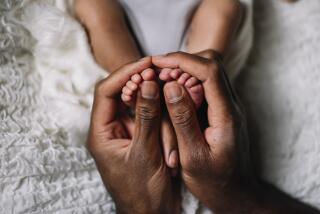Celebrate Those Who See Our ‘Grandness’ : Grandparents: Elders can be the mother of self-esteem and the father of self-respect as they pass their wisdom to the young.
- Share via
Today is Grandparents Day. While I’m not in favor of adding to the ever-growing list of nominal, national holidays we are called on to celebrate, respecting the aged and remembering our grandparents are necessary and important tasks for a culture that is aging and full of change. To “re-spect” means practically to look again: Sometimes looking again changes aged people into elders who carry the knowledge of survival born of experience.
The world of mythology tells us that the crossroads of life and death are inhabited by both the elders who are approaching death, and the children who are entering life. I don’t think it’s an exaggeration to say that when a culture forgets the value of its elders, its old people begin to forget who they are. And when we forget our elders, we also forget their connection to the youngest ones, our children. Without the felt sense of children entering life and elders entering death, a culture forgets how to hold and cherish life itself.
Because of their proximity to the great doors of death and life, grandparents and grandchildren are instinctively and intuitively connected to one another. The special affections and easy love that can flow between grandchild and grandparent have their source in the very word that names them-- grand . The “grand” in the old--the greatness, the nobility, the dignity--speaks directly to the grand in the young--the idealism, even the grandiosity. Between grandparents and grandchildren things can flow easily, because the elderly are beginning to let go, and the young are busy picking up what they find.
The mutual exchange of grandness does not stop at the door of biological grandparents, however. Many Americans, of course, never knew their biological grandfathers and grandmothers. But every living person has a grandmother and a grandfather somewhere in passed-on memories or in a figure borrowed from fables or literature. Grandfather can be an old neighbor, a dead poet, or a historical figure. Grandmother can be an early teacher or a revered woman who has survived the ravages of history or oppression.
Grandness, in fact, can be extended to anyone who can recognize the greatness in a child. Anyone who teaches another person and has the authority and the opportunity to touch and bless the grandness within them can become the mother of the self-esteem, the father of the self-respect, the magnet that draws inner dignity, nobility and creativity from that growing person.
Just as important, an elder’s sense of self-respect, dignity and reverence for life depends on the opportunity to give back to life what has been gathered: to share what has been received as gifts and what has been learned by suffering before it’s time to turn to the door of death. Within the stories of the survival of the elders hides wisdom that can be useful to younger people who are approaching the fires and floods of their own lives.
We each carry the expectation of having a piece of the grandness in us seen and touched by elders at some time, in some way. And unless the old can occasionally touch their own grandness, they forget that they are, in fact, elders. Instead they become simply old, tired and retired.
Rather than being just another obligatory, commercial holiday, Grandparents Day can be an opportunity to remember the occasions and the people who blessed the grandness in our lives. The contact with that inner grandness increases the dignity, the courage and the willingness to live life fully in all of its stages and increases our capacity to survive.


